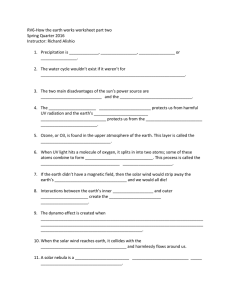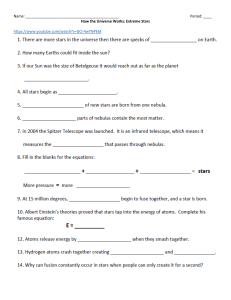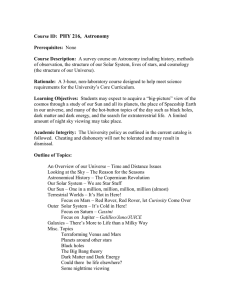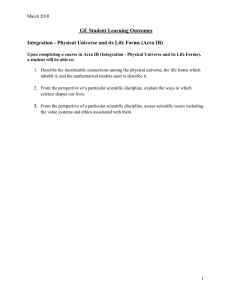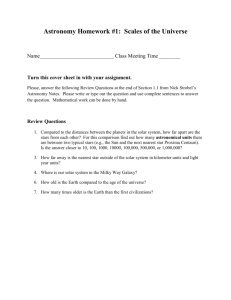pdfcoffee.com daily-lesson-log-in-earth-and-life-science-in-grade-11-pdf-free
advertisement
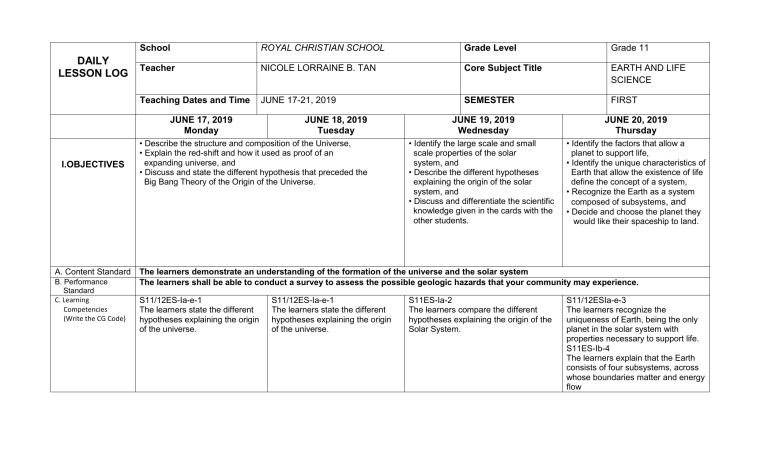
DAILY LESSON LOG School ROYAL CHRISTIAN SCHOOL Grade Level Grade 11 Teacher NICOLE LORRAINE B. TAN Core Subject Title EARTH AND LIFE SCIENCE Teaching Dates and Time JUNE 17-21, 2019 SEMESTER FIRST JUNE 17, 2019 Monday I.OBJECTIVES A. Content Standard B. Performance Standard C. Learning Competencies (Write the CG Code) JUNE 18, 2019 Tuesday • Describe the structure and composition of the Universe, • Explain the red-shift and how it used as proof of an expanding universe, and • Discuss and state the different hypothesis that preceded the Big Bang Theory of the Origin of the Universe. JUNE 19, 2019 Wednesday JUNE 20, 2019 Thursday • Identify the large scale and small scale properties of the solar system, and • Describe the different hypotheses explaining the origin of the solar system, and • Discuss and differentiate the scientific knowledge given in the cards with the other students. • Identify the factors that allow a planet to support life, • Identify the unique characteristics of Earth that allow the existence of life define the concept of a system, • Recognize the Earth as a system composed of subsystems, and • Decide and choose the planet they would like their spaceship to land. The learners demonstrate an understanding of the formation of the universe and the solar system The learners shall be able to conduct a survey to assess the possible geologic hazards that your community may experience. S11/12ES-Ia-e-1 The learners state the different hypotheses explaining the origin of the universe. S11/12ES-Ia-e-1 The learners state the different hypotheses explaining the origin of the universe. S11ES-Ia-2 The learners compare the different hypotheses explaining the origin of the Solar System. S11/12ESIa-e-3 The learners recognize the uniqueness of Earth, being the only planet in the solar system with properties necessary to support life. S11ES-Ib-4 The learners explain that the Earth consists of four subsystems, across whose boundaries matter and energy flow II. CONTENT Universe and Solar System Universe and Solar System Universe and Solar System Universe and Solar System III. LEARNING RESOURCES Earth Science (Initial Release) Earth Science (Initial Release) Earth Science (Initial Release) Earth Science (Initial Release) • Students will recall about the 3 theories of the origin of the universe • Learners will watch a video about the Big Bang Theory • Arrange the jumbled words/term and explain in your own words in regards of the universe. • Photo Analysis: The teacher will present the picture of the solar system • Pass the Earth Ball game: Basketball Shoot, Volleyball Spike, Baseball Bat, Soccer Kick • Learners will watch a video clip. • 4Pics1Word: Learners will guess the words of the prepared slides/pictures. • Celebrity Bluff: Learners will guess if the statement given is a Fact or a Bluff. C. ANALYSIS • “Why does the universe needs to expand?” • “Will the universe expand forever? Explain.” • “How does the Doppler effect explain the expansion of the universe?” • “Relate heat to the expansion of the universe.” • "What do you think is the reason why the sun is the center of our solar system?" • "What do you think is the reason why the sun is the center of our solar system?" D. ABSTRACTION Teacher will discuss about the composition, structure, accelerating expansion, cosmic microwave background radiation Teacher will discuss the terms, evolution & composition of universe, birth-death-rebirth of stars, & expanding universe Teacher will discuss the composition of the solar system and present the theories and hypothesis of the origin of the solar system. • Ask the learners what they know about or have experienced regarding El Niño/ Global Warming. • Learners will watch a video clip and present their ideas on the board. • Pinoy Henyo: Let the students take turns in guessing the word given to them and their partner will help them in giving clues and tips about the word/term. • "What is the importance of H2O in maintaining the temperature of a planet?" • "What do you think is the reason of the failure of mankind in protecting the environment and the life here on Earth?" Teacher will discuss the uniqueness of Earth and its four subsystems; geosphere/lithosphere, hydrosphere, atmosphere, and biosphere. E. APPLICATION The article about 3 theories of the origin of the universe will be distributed and the learners will read and collaborate with each other. The learners will watch two short video clips filmed inside a car. Try to determine where the horn is coming from. Is it coming from the inside the car or outside the car? If outside the car, where? The Truth Game: Students will work in pairs. Different kinds of cards will be given that needed to be matched together. Shuffle the cards and lay them face up on the table. IV. PROCEDURES A. Reviewing previous Lesson or presenting the new lesson B. ACTIVITY Interstellar Crash Landing : Ask students what factors would a planet be habitable. Learners should try to elaborate on their responses. Provide a copy of Table 1 - "Factors that Make a Planet Habitable" to each of the group (can be the same Find the six ‘Key Word Cards’ and make them into the heads of six columns. Find the six ‘Meaning Cards’ and match them to the ‘Key Word Cards’. Discuss any uncertainties that you have. Now, the students will need to place the 18 ‘Example Cards’ in the appropriate columns. Note that some columns will have more than others. Some may be suitable for placing in more than one column. People may not always agree. There are not always ‘correct’ answers. Again, discuss any uncertainties that you have. F. ASSESSMENT The learners will create a Venn diagram showing the similarities and differences of the 3 theories of the universe. Short Quiz 1. Describe the structure and composition of the Universe (10 pts.) 2. Explain the concept of the Red Shift and how it used as an evidence for an expanding universe (10pts.) 3. Explain the origin and evolution of the Universe according to the Big Bang Is the Solar System unique or rare? What is the possibility of finding a similar system within the Milky Way Galaxy? What about an Earth like planet? Research on the library or the internet about the presence of a solar system in the other galaxy. grouping as Activity 1). Ask students to read the document carefully and compare their answers they have given at the start of the activity Ask the students to imagine themselves in an interstellar voyage. Their spaceship suffers mechanical problems and will be forced to land. Fortunately they are passing through the Yanib System , which is composed of a sun-like star surrounded by seven planets, some of which have moons . The profiles of planets and moons of the Yanib System are listed on Table 2 (Provide each group a copy of Table 2). Students are to decide the best place to land their ship. Ask students to write down on a piece of paper their choice of planet or moon. Reasons for their choice should also be written down. Reasons why they did not choose the other planets should also be included. The learners will write an essay not exceeding 200 words on how man has altered the atmosphere, biosphere, hydrosphere, lithosphere, and as a consequence, the Earth System as whole. The learners will write a 200 word report/essay on the following topic: ‘Can man alter Mars environment to make it more suitable for human habitation? How?’ Theory (10 pts.) TOTAL ITEMS = 30 G. AGREEMENT Storyboard on the Origin of the Universe: Research and make/develop your own hypothesis or theory on the origin of the universe or solar system using your imagination and what you learned from the different theories we discussed. Support your theories in your own understanding based on empirical data. (50 pts.) Criteria: Content - 20 Theme and Creativity - 10 Writing Processes - 15 Layout - 5 Deadline: ? V. REMARKS Checked By: Verna Flores Principal What is the fate of the universe? Will the universe continue to expand or will it eventually contract because of gravity? Research about large scale and small scale properties of the solar system. Illustrate/draw the eight planets of the solar system based on the distance from the sun. (20 pts.) Study for the short quiz on Monday.
